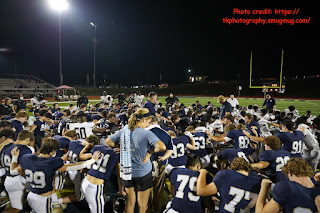As coaches, we need to train athletes about our clear and reasonable expectations and, today it requires a little more patience and a lot more individual time to educate these concepts. There just isn't a lot in culture right now that fosters the type of player we need to be to help a team succeed.
If my players aren't leading..... am I training them how to?And these aren't taught by lectures, they have to be framed and modeled throughout the program.
Unfortunately, the 'whack a mole' approach doesn't work if there isn't significant relationship capital there. I am not saying we don't give consequences for inappropriate actions or attitudes, but we have to be clear in the expectations, we need to be businesslike in administering discipline, and we need to evaluate what tools are best to use in the process.
And the reality is that parents are a huge key in this. When I used to administer school discipline as my job, the parent response was the single most important indicator of whether I could help a kid or not. If they were supportive of the process, we had a chance. If they decided right away that the kid was right and the school was stupid, I knew that it was unlikely I would ever be able to correct behavior.
This doesn't mean I was always right, but the parents willingness to support and join in the process as so important. It takes hard communication to get on the same page in those times, but crucial to any real change.
I developed a list a few years ago that tried to strike a comparison/contrast as another way of picturing the type of team we are trying to be.
Now, to use the term "Make Me Proud" or "Disappointing" does not work if I am not developing the type of relationship where that even matters.
What keeps this from merely being a weight-room sign or meaningless sloganeering?
There has to be real conversations about where players stand in these issues with a freedom to be where they are, who they are, and a positive plan for growth in the areas where a player is weak or has fallen. Honest question- is anyone ever really perfect in these areas?... sometimes it is a front where we hide from any chance to improve.
I think it would be interesting to see if a team's leaders would make up a similar chart about coaches.... what makes them proud of me or what disappoints them? Here are some guesses.
Standing up and fighting for them.... makes them proud
Spending time with them to hang out.... makes them proud
Knowing a lot about them- family, girlfriend, interests.... makes them proud
Not mocking or demeaning them in front of their peers... makes them proud
And I think each coach always needs to ask a simple question...
What am I demanding in my life that is comparable to what I am demanding in theirs?
Standing up and fighting for them.... makes them proud
Spending time with them to hang out.... makes them proud
Knowing a lot about them- family, girlfriend, interests.... makes them proud
Not mocking or demeaning them in front of their peers... makes them proud
And I think each coach always needs to ask a simple question...
What am I demanding in my life that is comparable to what I am demanding in theirs?
These are never ending issues, but it HAS to be a big WHY someone is a coach. Without these efforts, we are merely twisting in the wind of a game that really never loves us back. Numbers, records, and schemes will fade... but the relationships matter.


No comments:
Post a Comment